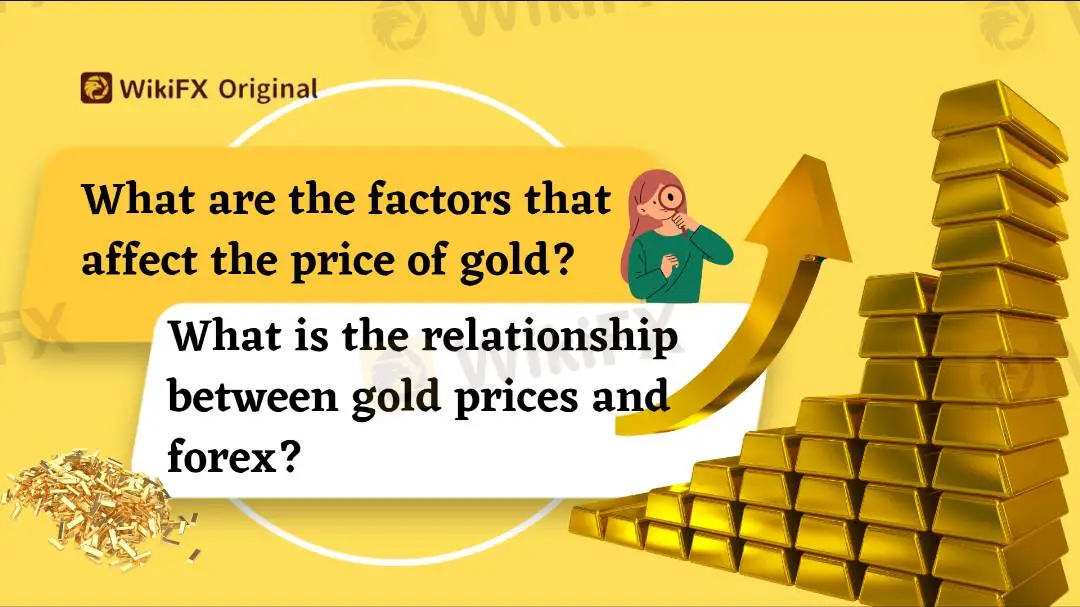Abstract:Gold is a relatively stable currency and a universally accepted currency in the world. Although the value of gold is relatively stable, its price is also influenced by many factors. In this article, we will introduce the factors that affect the price of gold and the relationship between gold prices and forex. It is worth noting for forex investors to carefully understand.

Factors Affecting Gold Prices
Political factors. Gold is known as a natural currency and has been used as such throughout the history of various countries and eras. One of the important attributes of gold is its safe-haven property. During times of political instability, the price of gold rises. For example, when the Soviet Union disintegrated on August 19, 1991, the price of gold rose by more than $10 within three minutes. During the Gulf War in 1992, gold prices remained stable at $400, but as the conflict subsided, the price of gold quickly fell, dropping by more than $50 within six months.
Macroeconomics. Since the US dollar became the mainstream global currency, the price of gold has been closely related to the US dollar. When the US economy improves, the US dollar rises and the price of gold falls. Conversely, when the US dollar falls, the price of gold rises. Additionally, the price of gold is related to the US Consumer Price Index (CPI) and inflation rate. When the CPI and inflation rate rise, the price of gold also rises, reflecting a positive correlation between the price of gold and the US CPI and inflation rate.
Supply and demand. Although gold is known as a natural currency, it is also a commodity, and thus subject to the inherent pricing principles of commodities. When market demand for a commodity continues to increase, the price of that commodity rises accordingly.
Oil relations. Gold prices also have a direct correlation with another important commodity: oil. As is well known, both spot and futures oil prices worldwide are denominated in US dollars. Changes in oil prices not only reflect supply and demand for oil, but also changes in the US dollar. When the US dollar rises, crude oil prices and gold prices fall!
The relationship between gold prices and forex
The relationship between gold prices and foreign exchange is becoming increasingly important for investors who seek diversified and fair investment opportunities. However, both gold and forex markets are volatile and carry risks and rewards. Understanding their mutual influence and interaction may reveal new investment opportunities. Here, we will discuss how gold and forex markets are intimately connected.
The price fluctuations of both gold and forex markets are affected by similar factors. With the ongoing globalization and integration of the world economy, there is a growing convergence of global financial markets. International capital can flow freely and rapidly across various markets, creating close links between them. Therefore, the price movements of one market can have an impact on the other. For the world's largest market, the forex market (measured by trading volume), and the most historical gold market, there is an inseparable relationship, and the changes in one market can affect the other.
The relationship between gold and forex markets is close, but how does the forex market affect the gold market? As the world gold market is denominated in US dollars, the fluctuation of the US dollar exchange rate in the forex market has a significant impact on gold prices. According to historical data from the past decade, there is an approximately 80% negative correlation between gold prices and the US dollar exchange rate. Generally speaking, if the US dollar rises, gold prices fall, and if the US dollar falls, gold prices rise.
There are several main reasons why the price of gold fluctuates in the foreign exchange market. Firstly, the rise and fall of the US dollar represents the market's confidence in US dollar-denominated assets. If the US dollar strengthens, it can attract funds to buy assets denominated in US dollars in order to gain profits. Conversely, if the US dollar weakens, some investors may lose confidence in US dollar assets and turn to gold as a means of preserving value and seeking profits. Secondly, a decline in the US dollar indicates an increase in the exchange rates of currencies such as the euro and the yen. This makes the gold price denominated in these currencies relatively cheaper, attracting investors to buy. The inflow of funds naturally drives up the price of gold.
The fluctuations in the price of gold also affect commodity currencies in the foreign exchange market. Commodity currency countries are characterized by high interest rates, a high proportion of exports to GDP, being the main producer and exporter of a certain primary product, and having their currency exchange rates moving in the same direction as the price of a certain commodity (or gold price). The main commodity currencies include the Australian dollar, the Canadian dollar, the New Zealand dollar, the Norwegian krone, and the South African rand. As an important commodity, the rise and fall of the gold price also has a certain impact on commodity currencies. Generally speaking, a rise in the gold price can drive up the exchange rates of commodity currencies, especially for important gold exporting countries such as South Africa. In recent years, the sharp rise in the price of gold has also boosted the exchange rate of the South African rand.
The price fluctuations in both the foreign exchange market and the gold market are influenced by some common factors. The current trend of global economic globalization and integration has brought about a large-scale integration of the world financial markets. International capital can flow freely and quickly among various markets, further linking markets around the world together. The rise and fall of prices in each market are closely related to each other. For the world's largest market - the foreign exchange market (measured by trading volume) - and the most historic gold market, the two are closely connected, and the price fluctuations and market changes in each market have a certain impact on the other market.
This article focuses on the factors that affect the price of gold and its relationship with forex trading. It is evident that the price of gold is not constant and can be influenced by the global economic environment, which in turn affects exchange rates and forex investments. As such, forex traders need to pay attention to changes in gold prices when making their trades.
This information is provided by WikiFX, and any reposting must be properly attributed.










